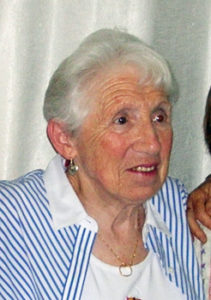As You Like It: Shoshanna
By Joan Florek SchottenfeldI lost my mom last month, and sadly it wasn’t the way I’d lost her almost 10 years ago at the Boston Museum of Fine Arts. Mom loved museums and I loved to take her. We would spend the day roaming the halls, gazing until we were exhausted.
One day we started out together, but suddenly I realized that I was very much alone. I thought that I would find her in the next room but she wasn’t there. I spent a panicked half hour racing through the museum feeling as If I were the lost little one. Where could my mommy be?
 And then suddenly there she was, staring at a painting. I’ll never forget my feeling of complete, utter relief. “Mom!” I yelled at her. “Where have you been? I’ve been running around searching for you! I thought I had lost you!”
And then suddenly there she was, staring at a painting. I’ll never forget my feeling of complete, utter relief. “Mom!” I yelled at her. “Where have you been? I’ve been running around searching for you! I thought I had lost you!”
She looked at me completely amazed. She had simply followed her eyes from room to fascinating room, from Greece to Rome, as she said later, never realizing that she was alone. I hugged her, holding onto her tightly, and we laughed together at my silly panic and went off to have coffee.
But now I search from room to room, memory to memory, and there is no finding her, no moment of wonderful relief, no celebratory hug at the end. She is well and truly gone now, leaving me in a world where the ground keeps shifting at my feet.
Rabbi Karen gave me that description of my days now. I walk around fearing each step, finding no solid ground to walk on. One of my pillars, my touchstone, is gone and I’m dizzy with the sheer pain of it. I find myself needing to sit down to reorient myself to this new world, and then not wanting to get up again.
I say to myself, “Well, you’re an orphan now,” and it seems such a silly thing for a 67-year-old woman to say, but that is exactly how I feel. There is no one left who remembers me as a baby, remembers my first steps or my first words. No one left to whom I can speak Yiddish, share memories of my dad, or my growing up. No one who remembers our endless, late night talks, our passionate arguments over nothing at all, our sheer enjoyment of being with each other. Those lonely thoughts are my life now. I thought she would live forever or at least a little longer. She was, after all, the unsinkable Molly Brown who overcame all obstacles but death.
Mom was 95 when she died. She grew up living a privileged life, then was thrust into the hell of the Holocaust. At Auschwitz as her parents were shoved into the left line, the line that moved to the crematorium, her father, Simon, who she adored, told her she had to live for everyone and that they would meet in Israel. Those were the words that shaped the rest of her life.
She met my dad in a displaced persons camp in Germany and from there they ended up in Brooklyn, New York, determined to live a full, happy life. I can see them dressed to go out, dad in a suit, mom wearing a beautiful cocktail dress whose skirt she would swirl as they danced. They loved to dance, to go to Broadway shows and out to dinner, and they took me with them.
And then finally mom was able to fulfill her father’s dream to move to Israel. She and my dad packed up their American life for a new chapter in a new country.
Once they were settled they enrolled in a class to learn Hebrew. Mom was given a Hebrew name by her teacher that fit her perfectly — Shoshanna. While Shoshanna is the translation of Rose, it is a very specific kind of rose, a wild flower that grows throughout Israel, unconstrained by walls or hothouse windows. And that was mom: independent, doing and saying whatever she pleased.
The last few years were different for us. We were older and more tired, more impatient with each other. We argued about useless things and vitally important things. We adored each other but we wanted different things: I wanted her safe; she wanted her independence. It was a road neither of us wanted to travel.
Happily she was able to live the last year of her life at Newbridge on the Charles, an amazing campus in Dedham dedicated to making senior lives better, safer, easier. Mom enjoyed her large, sunny room and how easy it was to walk to her political discussions, to art class, exercise, attend Shabbat services or Bible classes, or to simply relax with a cup of tea with friends in their shared living room.
The week after her death her rabbi, Karen, led a memorial service for her that left me open-mouthed. Staff, residents and their children came to tell “Rose stories.” They spoke of her spirit, her loving support, her feistiness in the face of old age. I laughed and cried and was amazed at this family that she had created in the final months of her life. Her favorite caregiver, Suzanne, told us that she wasn’t just a resident; she was a friend.
Mom, I hope that you knew how much I loved you, my Shoshanna, my wild rose. And I hope that wherever you are you’re still doing and saying whatever you please. As for me, I still search for you in the museum, hoping that I’ll finally find you one day.
Short URL: https://www.thecantoncitizen.com/?p=41712










